The Hushed-Up Hitler Factor in Ukraine and the Neo-Nazi Brigade Fighting Pro-Russian Separatists
- The Hushed-Up Hitler Factor in Ukraine - Dovid Katz (Consortium News)
- Ukraine Crisis: The Neo-Nazi Brigade Fighting Pro-Russian Separatists - Tom Parfitt (The Telegraph)
The Hushed-Up Hitler Factor in Ukraine
By Dovid Katz
August 16, 2014
Consortium News
Would America support any type of Hitlerism in the course of the State Department's effort to turn the anti-Russian political classes of Eastern Europe into paragons of PR perfection that may not be criticized, howsoever mildly?
It was frankly disconcerting to see Sen. John McCain, R-Arizona, embracing the leader of Ukraine's far right, anti-Semitic, pro-fascist Svoboda party last December. It was disturbing to learn of the neo-Nazi elements that provided the "muscle" for the actual Maidan takeover last February (BBC's Newsnight was among the few major Western outlets to dare cover that openly).
Most disturbing of all has been the mainstream Western media's almost Soviet-grade wall somehow erected against critical mention of the far-right component of Ukraine's 2014 history, rendering any such thought as worthy of ridicule on New York Times opinion pages last spring.
Most hilarious was the Times's May 2014 publication of an (obviously ghost-written, State Department-scripted) op-ed by Ukrainian presidential candidate Yulia V. Tymoshenko which quotes Churchill writing to Roosevelt, "Give us the tools, as we will finish the job," rumbling on about "the just and open democracy that is America's greatest bequest to the world."
This, from the far right politician who had shortly before that expressed genocidal musings for the millions of Russian-speaking citizens of her country, and who was, during her tenure as prime minister, a prime devotee of the wartime fascist leader Stepan Bandera, whose organization slaughtered tens of thousands (many historians put it at hundreds of thousands) of Polish and Jewish civilians based on ethnicity, in the Aryanist drive for an ethnically pure state precisely on the Nazi model.
It was therefore refreshing to read in last Saturday's Times a report that had, albeit buried near the end, a single line informing readers that "One [militia active in the Kiev government's military campaign] known as Azov, which took over the village of Marinka, flies a neo-Nazi symbol resembling a Swastika as its flag." By contrast, London's right-of-center Daily Telegraph ran a whole report Monday titled "The neo-Nazi brigade fighting pro-Russian separatists," rightly including the observation that the neo-Nazi forces being used by the Ukrainian government to do military heavy lifting "should send a shiver down Europe's spine."
This goes to the heart of what is being kept from so many Western, and especially American readers. Putin - for all his authoritarianism, anti-democratic bent and revanchism - is not the cause of the Ukrainian conundrum (though he is certainly exploiting it). There is a genuine divide in Ukraine between a nationalist-dominated west and a Russian-speaking east.
Anybody who has traveled the country will tell you that these "Russians" in the east, and wherever else they are to be found, would much rather be living in a European Union-type country than in a Russia-type country. What then is the problem? They do not want to live in an ultranationalist-dominated state that is anti-Russian in a 1930s Aryanesque sense of ethnically and linguistically pure Ukrainism. They much prefer the Russia-model state to that.
Now those anti-racist values, including the revering of the Anglo-American-Soviet alliance that brought down Hitler, and the disdain of societies founded on models of racist purity, are in fact also American values. But that affinity between Western values and the easterners would never even be guessed at in the avalanche of Cold War II newsfeed coming our way.
Incidentally, some Western reports that caricature the Putinist press's use of the word "fascists" for Ukrainian nationalists don't appreciate the colloquial Russian usage where it refers not necessarily to swastika-wielding thugs but even to high society that holds in esteem the likes of Bandera and other World War II-era Nazist fascists as supposed mythical "freedom fighters" to be revered today by the state, in street names, statues, museums, and more.
That is not to say that America's allies among the western Ukrainian nationalists are all pro-fascist. They are not. But there are two salient issues that go beyond Ukraine and cover all of "anti-Russian" Eastern Europe, particularly the new member states of NATO and the EU.
The first is casual acceptance of neo-Nazi elements, symbolism and ideology as part of any kind of supposedly centrist mainstream. In Latvia and Estonia, this is exemplified by tacit (or not so tacit) state support for honors for those countries' Waffen SS divisions. In Lithuania, it can be manifest in state-sponsored shrines to the Lithuanian Activist Front (LAF) killers who unleashed the Holocaust on Jewish neighbors before the first German soldiers had quite arrived.
But there is a second issue that is much deeper, and has nothing to do with these more ostentatious kinds of Nazi worship. That issue is history.
`History' Alive
While World War II is indeed "history" for the West, it is very much part of Now in Eastern Europe. State-sponsored institutions in the three Baltic countries, Lithuania, Latvia and Estonia, especially, and also at times in Croatia, Romania and elsewhere have invested a fortune in a kind of Holocaust revisionism that would whitewash their own nationalists' collaboration with Hitler and turn the Soviet Union into the real Hitler.
Known as "Double Genocide," it posits the absolute theoretical equality of Nazi and Soviet crimes. Its constitution is the 2008 "Prague Declaration," which most Americans have never heard of, that sports the word "same" five times in reference to Nazi and Soviet crimes. Even fewer Americans know that one of its demands, that the world accept a unitary mix-and-match day of remembrance for Nazi and Soviet victims, was snuck under the radar into last June's congressional military appropriations bill.
The issue across the board is the choice made by nationalist elites in Eastern Europe to construct national myths not on the merits of a country's great artists, poets, thinkers and genuine freedom fighters, but all too often, on the basis of Nazi collaborators whose claim to fame is that they were also "anti-Soviet patriots."
The fact of the matter is that virtually all of Hitler's collaborators in Eastern Europe were "anti-Soviet." In fact, the Soviet Union was the only power putting up resistance to Hitler in Eastern Europe. If the Soviets had not pushed the Nazi armies back by the spring of 1944, at huge sacrifice to all the Soviet peoples, there would have been no D-Day or opening of a Western front.
Whether it is hero-worship of Hungary's Miklós Horthy, leaders of Croatia's Hitlerist Ustasha, the Nazis' Waffen SS divisions in Latvia and Estonia, or the likes of Ukraine's Bandera and his OUN and UPA, and the Waffen SS, it is an offense to Western values that a NATO or EU state, or NATO/EU-aspiring state, would disburse state funds on the distortion of history, obfuscation of the Holocaust and construction of societies that admire the worst of history's racists.
To do so quite simply implies that all the minority citizens they butchered, or whose butchering they supported, were quite unworthy of continued existence. Incidentally, all these countries have real heroes from that darkest moment in their history: those (often the simplest of people) who just did the right thing and risked all to rescue a neighbor from the Nazist establishment collaborationist leadership of their own nationalists.
A High Low Point
The trend reached an unseemly highpoint in 2012, when the Lithuanian government financed the repatriation from Putnam, Connecticut, to Lithuania of the remains of the 1941 Nazi puppet prime minister Juozas Ambrazevicius Brazaitis, who had personally signed documents confirming Nazi orders first, for Jewish citizens of his city, Kaunas, to be sent to a concentration camp (it was actually a mass murder site), and a few weeks later, for the remainder to be incarcerated in a ghetto within four weeks.
Instead of politely protesting, the American embassy in Vilnius helped camouflage the event with a symposium on the war and the Holocaust that did not even mention the reburial underway.
According to some in State Department circles, the Obama administration, shaken by criticism of its long-standing anti-neocon caution in Iraq and Syria, and rueful over Libya, has tried to show its muscle, and satisfy the contingent led by Robert Kagan and his wife, Victoria Nuland, now assistant secretary of state for European and Eurasian Affairs, with sheer one-sidedness over Ukraine.
That is the Ms. Nuland who was caught telling the U.S. ambassador to Ukraine "Fuck the EU," which would have preferred peaceful, democratic change in Ukraine. She was also plotting which politician would emerge as prime minister in that nation in the worst neo-con tradition of organizing who will emerge as ruler after the next fixed case of foreign regime change.
In Ukraine, a negotiated solution could maintain the nation's independence and freedom to join the EU but not the military alliance NATO that is the huge humiliation for Russia (a hostile military alliance coming right to more of its borders).
Any viable solution needs to take into account that it is a deeply divided country even in the absence of (ever-present) Putinist mischief. It therefore needs to also take into account the many millions of Russian speakers who oppose the racial chauvinism of some of the nationalist elite now in or close to the government, and who have very different ideas about Twentieth Century history.
That is the way forward, not the Cold War II nonsense of spreading the word that the westerners are pure angels and the easterners pure demons, not the neocon nonsense that America's greatness depends on endless foreign military misadventures in regime change that lead to long , unpredictable, and uncontrollable cycles of violence.
That America shares with Russia the magnificent legacy of having in tandem brought down Hitler's empire is a heritage worth invoking for building better understanding, not a fact to be buried in deference to the far-right revision of Holocaust history with which much of nationalist Eastern Europe is so obsessed.
[Dovid Katz, formerly professor of Yiddish Studies at Vilnius University, is a New York born, Vilnius-based independent researcher. He edits DefendingHistory.com. His personal website is www.dovidkatz.net.]
Ukraine Crisis: The Neo-Nazi Brigade Fighting Pro-Russian Separatists
Kiev throws paramilitaries - some openly neo-Nazi - into the front of the battle with rebels
By Tom Parfitt, Urzuf
August 11, 2014
The Telegraph (UK)
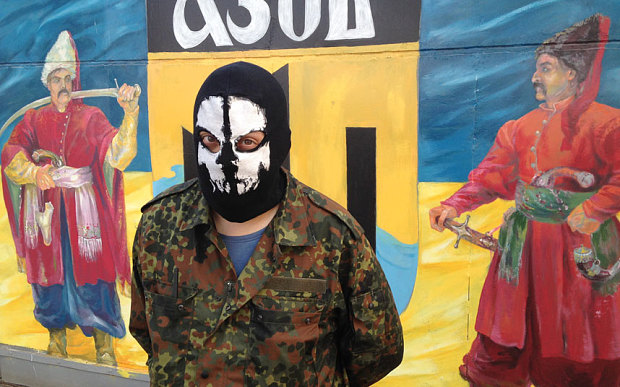
Phantom, 23, a fighter in the Azov battalion, outside its HQ in the Ukrainian seaside town of Urzuf
Photo: Tom Parfitt // The Telegraph
The fighters of the Azov battalion lined up in single file to say farewell to their fallen comrade. His pallid corpse lay under the sun in an open casket trimmed with blue velvet.
Some of the men placed carnations by the body, others roses. Many struck their chests with a closed fist before touching their dead friend's arm. One fighter had an SS tattoo on his neck.
Sergiy Grek, 22, lost a leg and died from massive blood loss after a radio-controlled anti-tank mine exploded near to him.
As Ukraine's armed forces tighten the noose around pro-Russian separatists in the east of the country, the western-backed government in Kiev is throwing militia groups - some openly neo-Nazi - into the front of the battle.
The Azov battalion has the most chilling reputation of all. Last week, it came to the fore as it mounted a bold attack on the rebel redoubt of Donetsk, striking deep into the suburbs of a city under siege.
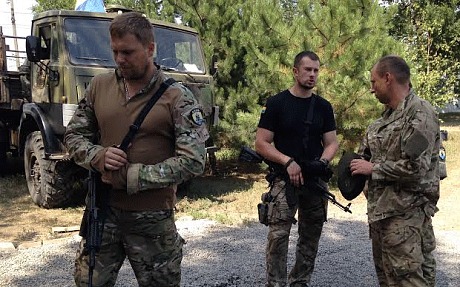
Andriy Biletsky, in black T-shirt, commander of Ukraine's Azov battalion.
Photo: Tom Parfitt // The Telegraph
In Marinka, on the western outskirts, the battalion was sent forward ahead of tanks and armoured vehicles of the Ukrainian army's 51st Mechanised Brigade. A ferocious close-quarters fight ensued as they got caught in an ambush laid by well-trained separatists, who shot from 30 yards away. The Azov irregulars replied with a squall of fire, fending off the attack and seizing a rebel checkpoint.
Mr Grek, also known as "Balagan", died in the battle and 14 others were wounded. Speaking after the ceremony Andriy Biletsky, the battalion's commander, told the Telegraph the operation had been a "100% success". "The battalion is a family and every death is painful to us but these were minimal losses," he said. "Most important of all, we established a bridgehead for the attack on Donetsk. And when that comes we will be leading the way."
The military achievement is hard to dispute. By securing Marinka the battalion "widened the front and tightened the circle", around the rebels' capital, as another fighter put it. While Vladimir Putin, Russia's president, prevaricates about sending an invasion force into Ukraine, the rebels he backs are losing ground fast.
But Kiev's use of volunteer paramilitaries to stamp out the Russian-backed Donetsk and Luhansk "people's republics", proclaimed in eastern Ukraine in March, should send a shiver down Europe's spine. Recently formed battalions such as Donbas, Dnipro and Azov, with several thousand men under their command, are officially under the control of the interior ministry but their financing is murky, their training inadequate and their ideology often alarming.
**The Azov men use the neo-Nazi Wolfsangel (Wolf's Hook) symbol on their banner and members of the battalion are openly white supremacists, or anti-Semites.
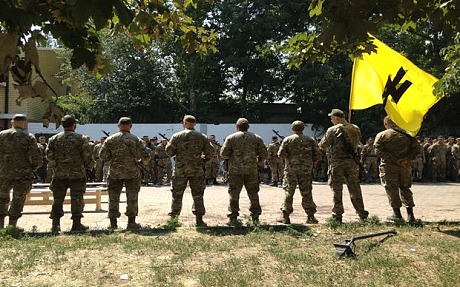
The Azov battalion uses the neo-Nazi Wolfsangel (Wolf''s Hook) symbol on its banner
Photo: Tom Parfitt // The Telegraph
"Personally, I'm a Nazi," said "Phantom", a 23-year-old former lawyer at the ceremony wearing camouflage and holding a Kalashnikov. "I don't hate any other nationalities but I believe each nation should have its own country." He added: "We have one idea: to liberate our land from terrorists."
The Telegraph was invited to see some 300 Azov fighters pay respects to Mr Grek, their first comrade to die since the battalion was formed in May. An honour guard fired volleys into the air at the battalion's headquarters on the edge of Urzuf, a small beach resort on Ukraine's Azov Sea coast. Two more militiamen died on Sunday fighting north of Donetsk <<Aug 10>>. Petro Poroshenko, Ukraine's president, called one of them a hero.
Each new recruit receives only a couple of weeks of training before joining the battalion. The interior ministry and private donors provide weapons.
The HQ is a seaside dacha compound dotted with pines that once belonged to the ousted president of Ukraine, Vladimir Yanukovich, when he was governor of this region. Families in swimsuits with towels and inflatable rings walk past gate-guards toting automatic rifles.
Parked inside among wooden gazebos overlooking the sea are the tools of Azov's trade - two armoured personnel carriers, a converted truck with retractable steel shutters to cover its windows, and several Nissan pick-ups fitted with machine-gun mounts.
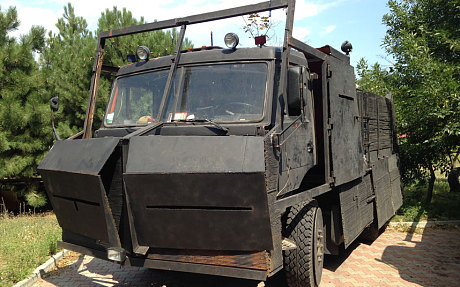
A converted truck with steel shutters used by the Azov battalion and known to the fighters as 'the Lump of Iron'
Photo: Tom Parfitt // The Telegraph
Mr Biletsky, a muscular man in a black T-shirt and camouflage trousers, said the battalion was a light infantry unit, ideal for the urban warfare needed to take cities like Donetsk.
The 35-year old commander began creating the battalion after he was released from pre-trial detention in February in the wake of pro-western protests in Kiev. He had denied a charge of attempted murder, claiming it was politically motivated.
A former history student and amateur boxer, Mr Biletsky is also head of an extremist Ukrainian group called the Social National Assembly.
"The historic mission of our nation in this critical moment is to lead the White Races of the world in a final crusade for their survival," he wrote in a recent commentary. "A crusade against the Semite-led Untermenschen."
The battalion itself is founded on right wing views, the commander said in Urzuf, and no Nazi convictions could exclude a recruit. "The most important thing is being a good fighter and a good brother so that we can trust each other," he said.
Interestingly, many of the men in the battalion are Russians from eastern Ukraine who wear masks because they fear their relatives in rebel-controlled areas could be persecuted if their identities are revealed.
Phantom said he was such a Russian but that he was opposed to Moscow supporting "terrorists" in his homeland: "I volunteered and all I demanded was a gun and the possibility to defend my country."
Asked about his Nazi sympathies, he said: "After the First World War, Germany was a total mess and Hitler rebuilt it: he built houses and roads, put in telephone lines, and created jobs. I respect that." Homosexuality is a mental illness and the scale of the Holocaust "is a big question", he added.
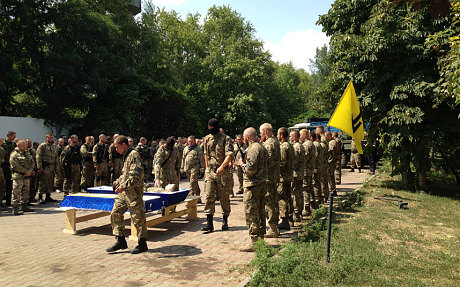
Fighters of the Azov battalion say farewell to their first comrade to die in the war against Russia-backed rebels.
Photo: Tom Parfitt // The Telegraph
Stepan, 23, another fighter, said that if leaders of the pro-Russian separatists were captured they should be executed after a military tribunal.
Such notions seem a far cry from the spirit of the "Maidan" protests that peaked in Kiev in February with the ousting of Mr Yanukovich, who had refused to sign a trade agreement with the European Union. Young liberals led the way but the uprising, which ended with the president fleeing to Russia, provoked a huge patriotic awakening that sucked in hardline groups.
Azov's extremist profile and slick English-language pages on social media have even attracted foreign fighters. Mr Biletsky says he has men from Ireland, Italy, Greece and Scandinavia. At the base in Urzuf, Mikael Skillt, 37, a former sniper with the Swedish Army and National Guard, leads and trains a reconnaissance unit.
"When I saw the Maidan protests I recognised bravery and suffering," he told the Telegraph. "A warrior soul was awakened. But you can only do so much, going against the enemy with sticks and stones. I had some experience and I though maybe I could help."
Mr Skillt says he called himself a National Socialist as a young man and more recently he was active in the extreme right wing Party of the Swedes. "Now I'm fighting for the freedom of Ukraine against Putin's imperialist front," he said.
His unit is improving fast under his tutelage. "What they lack in experience, they make up in balls," he said. Once he is done with Azov -where he claimed he receives a nominal GBP100 a month - Mr Skillt plans to go to Syria to fight for President Bashar al-Assad as a hired gun earning "very good money".
Such characters under Kiev's control play straight into the hands of Russian and separatist propaganda that portrays Ukraine's government as a "fascist junta" manipulated by the West.
"These battalions are made up of mercenaries, not volunteers," said Sergei Kavtaradze, a representative of the rebel authorities in Donetsk. "They are real fascists who kill and rape civilians." Mr Kavtaradze could not cite evidence of his claim and the battalion says it has not harmed a single civilian.
Ukraine's government is unrepentant about using the neo-Nazis. "The most important thing is their spirit and their desire to make Ukraine free and independent," said Anton Gerashchenko, an adviser to Arsen Avakov, the interior minister. "A person who takes a weapon in his hands and goes to defend his motherland is a hero. And his political views are his own affair."
Mark Galeotti, an expert on Russian and Ukrainian security affairs at New York University, fears battalions like Azov are becoming "magnets to attract violent fringe elements from across Ukraine and beyond". "The danger is that this is part of the building up of a toxic legacy for when the war ends," he said.
Extremist paramilitary groups who have built up "their own little Freikorps" and who are fundamentally opposed to finding consensus may demand a part in public life as victors in the conflict, Mr Galeotti added. "And what do you do when the war is over and you get veterans from Azov swaggering down your high street, and in your own lives?"
[Tom Parfitt covers Russia and the former Soviet Union from the Telegraph's Moscow bureau. He has reported on the 2004 Beslan school siege, the 2008 war in Georgia and the growth of dissent in Vladimir Putin's Russia. He is especially interested in the North Caucasus region.]

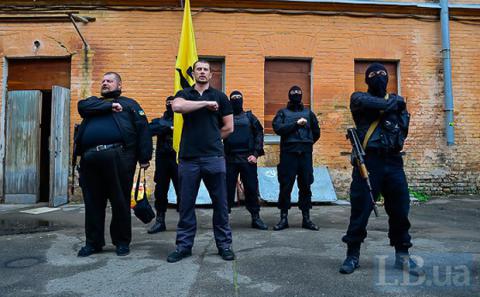
Spread the word